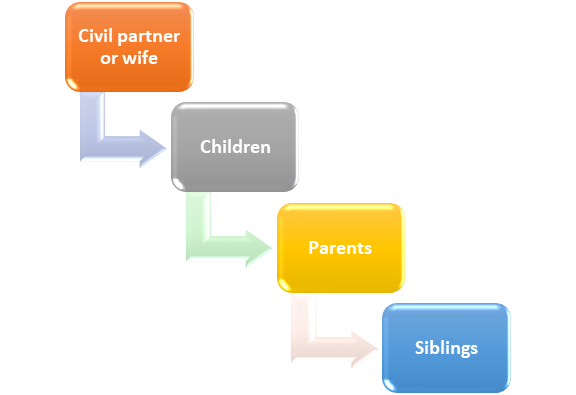What is Next of Kin?
The term "next of kin" refers to an individual's nearest living blood relative, a person who may have inheritance rights and obligations. A few countries have altered their laws to accommodate those who are tied by adoption or marriage.
Consider the instance of marriage, if you are married, your wife would be your next of kin. If you are divorced, single, or widowed, your children are your next of kin. Then your parents are regarded as your next of kin; if your parents are deceased, your siblings are considered your next of kin in order of birth.
The phrase "next of kin" is most typically used in Estate Law when a person dies without making a will and has neither a spouse nor children. Though the exact criteria used to determine next of kin will vary from state to state.
Furthermore, the next of kin may have obligations both during and after their relative's life. For instance, if the person becomes disabled, the next of kin may need to make medical decisions for them or bear responsibility for their funeral ceremony and financial issues if their relative passes away.
However, if an individual has a legitimate will at the time of their death, the named executor is responsible for fulfilling the terms and conditions of the will. Only in the absence of a will, a next of kin be required to carry out these responsibilities.
Furthermore, like a relative's next of kin, you could inherit a few of your relative's digital assets and duties, such as the deceased subscriber's contact information and email account. For instance, Microsoft gives a DVD containing a deceased subscriber's entire Outlook account to the decedent's next of kin so that the relative can take over to pay bills, shutting the account, or notifying business contacts.
Summary
- Next of kin refers to an individual's nearest living blood relative, a person who may have inheritance rights and obligations.
- The phrase "next of kin" is most typically used in Estate Law when a person dies without making a will and has neither a spouse nor children.
- Next of kin may have obligations both during and after their relative's life.
Frequently Asked Questions (FAQs)
Who can be considered the next of kin?
When dealing with a loss, the phrase "next of kin" is commonly used to refer to the deceased person's nearest relatives. In certain instances, doctors, nurses, and police officers inform on the top priority so that other family members or friends can be notified.

Source: © Jojojojo | Megapixl.com
When it comes to determining who can be considered next of kin, the following priority list is widely accepted:
- Civil partner or wife: Assume a person has died, and if he was married or in a civil partnershipat the time, their civil partner or wife should be considered their next of kin.
- Children: If there is no living civil partner or wife, the deceased person's children should be deemed their next of kin unless they are under 18.
- Parents: In the absence of a will, and assuming the deceased person had no living civil partner or wife, as well as no children over the age of 18, their parents are presumed to be their next of kin.
- Siblings: Siblings could be considered next of kin if the deceased person had no surviving children, parents, wife, or civil partner.

Source: Copyright @2021 Kalkine Media
What other rights and responsibilities does the next of kin have?
If a person dies without writing a will, children, wives, parents, and siblings may be next of kin. If the person who died left a will, the will's executors are responsible for carrying out specified tasks.
Other rights and responsibilities of the next of kin are listed below.
Medical treatment
In most cases, the patient's next of kin in the hospital is responsible for:
- If there is an emergency, the next of kin can easily be reached, and other people must be informed.
- When the treatment has been completed successfully, taking the patient home.
- Making rational decisions if the patient's decision-making capacity is lost.
Inheritance
Children, civil partners, wives, grandchildren, siblings, half-brothers and half-sisters, aunts and uncles, and children of aunts and uncles are widely expected as next of kin when a person dies without writing a will, and they stand to inherit most of their property.

Source: © Monkeybusinessimages | Megapixl.com
Probate applications
When a person dies without a will, the next of kin is also responsible for applying probate. This is because, under the principles of intestacy, they are the person who stands to inherit the most.
On the other hand, probate is a legal procedure in which a will is examined to see whether it is appropriate and legitimate. Probate also refers to the general administration of a deceased's will or the deceased's property who died without a will. A probate court typically examines a property owner's assets when he dies. The probate court makes the ultimate decision on asset division and allocation among beneficiaries.
The next of kin will be designated as the property administrator once the application has been submitted to the probate registry and accepted. They'd have access to accounts, be able to sell real estate, and disperse assets to anyone but themselves.
How do the specifics of determining next of kin differ depending on jurisdiction?
Depending on the jurisdiction, the details of identifying next of kin and inheritance will differ. For example, inheritance issues in the United Kingdom are handled differently under distinct succession rules.
The right of a relative to inherit or gain estate by inheritance exists in the United States due to state legislation and legislative action. Inheritance priority and next-of-kin relationships are determined by state law. The legislature of a state has complete control over the allocation of estates inside the state's borders. If no legal successor can be found, the deceased's estate will become government property.
 Please wait processing your request...
Please wait processing your request...